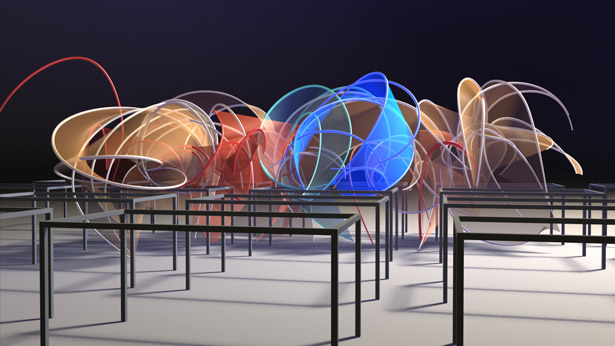Synchronous Objects: Degrees of Unison
Installation by Norah Zuniga Shaw
February 2–26, 2012
Wed–Sun 2–7pm
Opening:
February 2, from 6–8 pm
Goethe-Institut Wyoming Building
5 East 3rd Street (at Bowery)
New York, NY 10003
Synchronous Objects: Degrees of Unison is a multipart sound and video installation focusing on “One Flat Thing, reproduced,” an ensemble dance by William Forsythe.
Focusing on the choreographic visualization online project Synchronous Objects created by Norah Zuniga Shaw, Maria Palazzi and William Forsythe, the installation brings viewers into an encounter with the deep structures of a dance and the generative ideas contained within. A series of visual objects—animations, computer graphics, interactive tools—enact a parallel performance of Forsythe’s choreographic ideas. The work was first launched online in 2009 and is still available in this form. In the installation, Norah Zuniga Shaw stays close to the conceptual foundations of the online original while extending them into the architectural and experiential possibilities of the Goethe-Institut Wyoming Building. In addition to interacting with the site and viewing HD animations from the project, visitors can spend time within a circle of synchronized visualizations unfolding from dance to data to objects over the 15-minute time span of the piece. William Forsythe’s voice calls out timing to the dancers and the sounds of the dancers’ actions move in multi-channel choreography around the space. Finally, a paper proliferation of creative processes can be found to read, leave behind, sort, or carry home.
Synchronous Objects: Degrees of Unison (2010)
A video installation by Norah Zuniga Shaw based on original material from
Synchronous Objects for One Flat Thing, reproduced (2009)
By William Forsythe, Norah Zuniga Shaw, Maria Palazzi
Objects in Performance
Symposium curated by André Lepecki, Performance Studies, NYU
February 3–4, 2012
NYU’s Tisch School of the Arts, Performance Studies
721 Broadway, 6th floor
New York, NY 10003
The recent phenomenon of object-invested experimental dance and performance echoes the resurgence of the object in recent philosophy, critical theory, literary and cultural studies; as well as in the renewed interest in the concept of the object in the visual arts. This resurgence of the object also has implications for studies on subjectivity. If, as Deleuze once said, “the status of the object is changed, so is the subject’s,” it is crucial to investigate the contemporary nature of this phenomenon. The Objects in Performance Symposium will gather a group of renowned American, German, and international scholars and artists, from a variety of fields and perspectives, to present their most recent research on the matter. The environment will be such as to stimulate exchange and conversation between disciplines, and between artists and scholars.
With Barbara Browning, Franz Anton Cramer, Eleonora Fabião, George Ferrandi, Jenn Joy, Heather Kravas, Thomas Lehmen, André Lepecki, Eva Meyer-Keller, Sarah Michelson, Ann Pellegrini, Allen S. Weiss, Norah Zuniga Shaw.
Death is Certain
Performance by Eva Meyer-Keller
February 5, 2012, 2 performances at 6:00 pm and 07:30 pm
MINI/Goethe-Institut Curatorial Residencies Ludlow 38
38 Ludlow Street (btw. Grand & Hester)
New York, NY 10002
Cherries have tender skin, meat and a kind of bone inside them. Their juice is red like blood. When you treat them like humans sometimes treat other humans, then they become human themselves or at least animated objects, which invite you to identify yourself with them. In the performance Death is Certain, Eva Meyer-Keller has installed sweet cherries as her protagonists.
The viewer is reminded of deaths from films, but also the reality of executions, how they really happen: associations from individual and collective experience in face of the sweet death at the kitchen table.
The Goethe-Institut New York is a branch of the Federal Republic of Germany’s global cultural institute, established to promote the study of German language and culture abroad, encourage international cultural exchange, and provide information on Germany’s culture, society, and politics.


